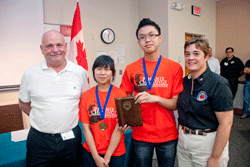Education Training: School's in Session
- Published: August 01, 2011, By By Deborah Donberg, Contributing Editor
Scrap reduction was the topic of a recent workshop organized by Nordmeccanica, Edgewood, NY, and Henkel, Cary, NC, but the lessons learned went beyond the agenda. With suppliers, converters, and educators gathering at Nordmeccanica's US headquarters, the event could be considered a model for the cooperation needed to meet the challenges facing converters in the hunt for a well-educated, well-trained workforce.

Cooperation isn't always easy, what with proprietary interests pushed by competition. And that's just one of the challenges. Travel budgets have been cut to the bone, and government funding for schools is down, while technological advances continue apace, requiring more education than ever. All parties agree that online education is at least a partial solution.
The I-Classroom
Dr. Guido Kollbach, technical director for Liofol laminating adhesives at Henkel, says his company is using online training more and more. “Even in times that are economically better, we still can save the travel costs. Also, it gives people a chance to train at their own pace and on their own schedule.”
The Center for Flexible Packaging at Clemson Univ. in South Carolina offers webinars and online courses both for college credit and continuing education, says Dr. Duncan Darby, associate professor and center's director (as well as keynote speaker at the scrap reduction workshop). “We will continue to expand those offerings. They can be offered to a particular company; for example, if they have 20 operators who need to understand more about extrusion, we could set up something online for them.”
Webinars that bring industry suppliers into the “classroom” are offered once a week in the summer from Clemson's Dept. of Graphic Communications, where Dr. Sam T. Ingram is chair and professor. Ingram's department runs combination webinars once a week in the summer with both students and industry people, but he acknowledges there is a big drawback to online education. “Taking content into an actual application has always been the key step needed, and obviously online that's not quite a reality yet. But one thing we're doing is putting an upfront pre-read online for students before they go into the lab. It tells them what their activities will be, covers things such as software use and setup for machines so they will be prepared when they go into lab.”
Broaden Focus, Keep Basics
Schools are helping students cope with tough times by broadening their offerings. DiTrolio Flexographic Inst., Broadview, IL, which presently offers seminars to give sales and customer service reps information on what goes on in the pressroom, soon will be teaching customer service and offering training to sales and front office workers.
Sam Ingram says his program graduates generalists. “New students may say, 'I want to be a designer.' I tell them not to lose the dream, but they have to cover all printing processes and find out about jobs they may not have known were there. Part of that is keeping our students well-grounded in business as well as technology and the creative side. Many companies today are calling for graduates who can wear any number of hats. [A first job] may not be their long-term dream of a career, but your work is a journey.”
Nothing will replace the basics, however, says Vincent DiTrolio, president of the DiTrolio Flexographic Inst. “Some of the challenges we see involve reinforcing those basics. Companies will document everything for a while, do it all by the numbers, and everything's running smoothly. They've got experienced guys who know what to do. But then complacency sets in. New people come in who aren't as familiar with the process. And now they're on a downward slope and have to start that climb up again. Also, we've been told by an operator that he has no problems, and then we tape his shift. The same problem arose over and over, and each time, he fixed it. He didn't see it as a problem. But of course, that problem shouldn't keep coming up.”
Darby believes in basics as well. “We're typically thinking in terms of graduating students with degrees,” he says of his program, “but where we really need to build skill sets is in our operators and our process engineers. If we're educating our already educated people, then we may not be doing what really benefits companies. If we really want to improve the industry, we need to aim at the shop floor.”
Signing Up for Flexo
Taking aim even earlier is Peter Belanger, who teaches flexo at the Gordon Graydon Memorial Secondary School in Mississauga, ON, Canada. Many of his students have gone on to win the Phoenix Challenge competition, but Belanger says the program has its own set of challenges. “It's a chore to try and convince kids to sign up. “Flexo is a well-kept secret, and it's not very glamorous!” One way Belanger counteracts that is with an annual Career in Flexo day. “Industry suppliers and converters come into the school - last year I had 34 companies - in the form of a trade fair. Lots of kids say, “Wow, I had no idea what this was about!” We invite parents in as well. I would love to see this thing grow.”
Belanger also has a night school program for adults in the industry in conjunction with the Flexographic Technical Assn. (FTA), Bohemia, NY. At the end of the course, students can choose to write a Level I or Level II exam and be FTA certified at that level.
One of Belanger's biggest challenges is acquiring new equipment. Anilox rolls are maintained and redone by Harper Corp. of America, Charlotte, NC, the company that seeded Gordon Graydon high school (and others) in the mid-1990s with matching funds, and Belanger gets inks and materials donated by supportive suppliers. But big-ticket items like presses are different. “Our program gets very little funding from the board,” Belanger, says, “and I've been trying to convince a company to put in a modern press, perhaps even for just a year or two. We could use it for training our students, but in addition, if the manufacturer sells a press like it to someone in the area, the customer could come here, and I would train them on it.”
Points of Interface
Sam Ingram talks about the “generosity and support of industry suppliers who bring their technologies into our laboratories,” adding that there are points of interface with both suppliers and converters, for example, when they work with students on projects. Graduates of his flexible packaging program at Clemson do two internships in industry plants. Ingram's department also works with the Sonoco Inst. of Packaging Design and Graphics in a collaborative effort that includes other university departments such as packaging sciences, material sciences, marketing, and computer science to focus on R&D, material development, and so on. “Our training program for industry employees to learn new skills or upgrade skills is housed in the Sonoco Inst. We offer both basic and advanced opportunities. And there are workshops and symposiums at the university. All of these things bring our industry and academia touch points together.”
Vince DiTrolio also believes suppliers generally are supportive, but he would like to see more buy-in from converters. “If converters are in an area with a school, they need to help out those schools. Financially, of course, but there are other ways. They might send speakers to the school, for example. Our advisory board helps us make sure our curriculum meets the needs of the converters, but I challenge converters to step up and say, 'you're providing me with a workforce; here's what we need, and here's what we can do to help support you.' They will wind up with a workforce that's ahead of the curve.”
The Supplier Side
While Henkel and Nordmeccanica are not the only suppliers offering organized educational forums and programs, both companies have a history of valuing education. In addition to partnering with Henkel on the scrap reduction issue, Nordmeccanica's commercial director Giancarlo Caimmi says his company has been working with Dow Chemical, Piscataway, NJ, for about three years, offering environmental workshops targeted to emission reduction and energy savings, as well as promoting technologies friendly to waste reduction. (See PFFC, May 2011, p13, for details of the scrap reduction workshop or visit http://bit.ly/q13ZU7.)
Henkel has always seen education as part of its service, says Kollbach. “But in addition, we have created Liofol Academy in Dusseldorf, a training program for new operators, kind of a crash course in web handling and waste mitigation, how to make a good laminate, and so on.”
In the opinion of Caimmi, the schools tend to be somewhat behind the converters, equipment manufacturers, adhesive suppliers, etc. “We're trying to involve the schools in more R&D,” he says, “though we have to deal with proprietary interests. Many companies are reluctant to reveal their secrets. But energy savings is one example of something that would benefit the entire industry if more companies come together in R&D through the institutions.”
Kollbach agrees. “The schools do a good job and are very important, especially in topics that cover a broad range, such as sustainability. No one company will be able to tackle this by itself. Some basic research is needed. And by having research come out of the schools, you avoid the issue of company secrets, which can hinder progress at times. There is a big movement now toward open innovation, and universities can be a wonderful catalyst toward the process of getting innovations to market quickly.”
Training challenges remain, and some always will, but Guido Kollbach believes things will pick up soon, and he reports seeing a lot of smiling faces at a recent industry show. After all, finding solutions has always been what converters - and their suppliers - do best.
Resource Info
-
Nordmeccanica | www.nordmeccanica.com
-
Henkel | www.henkelna.com
-
Clemson Univ. | www.clemson.edu
-
DiTrolio Flexographic Inst. | www.flexotraining.com
-
Gordon Graydon Memorial Secondary School | www.peelschools.org
-
Flexographic Technical Assn. | www.flexography.org
-
Harper Corp. | www.harperimage.com
-
Sonoco Inst. | www.clemson.edu/sonoco_institute
-
Dow Chemical | www.dow.com
Contributing editor Deborah Donberg is the former managing editor of PFFC. She has been covering the converting industry for more than 25 years. Contact her at ddonberg@gmail.com.
Harper Helps Mexican School
Harper Corp. of America, Charlotte, NC, has donated three anilox rolls to a new flexo printing school in Monterrey, Mexico. The rolls will be used on a 7-in. Mark Andy 830 press.The school was established by ACOBAN, the Mexican Assn. of Narrow Web Printers, and CONALEP, the College of National Education for Professional Technicans.
Juan Bermúdez, sales and service manager for Harper's Latin American division, says, “Not only will this donation allow Harper Corp. to contribute to the development of the flexo education in Mexico, it will allow us to gain a higher level of international recognition and work to build relationships with the students that they can count on when they graduate and embark on their careers.”
-
Harper Corp. | www.harperimage.com
-
Mark Andy | www.markandy.com












